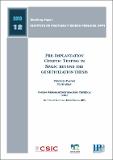Por favor, use este identificador para citar o enlazar a este item:
http://hdl.handle.net/10261/27361COMPARTIR / EXPORTAR:
 SHARE
BASE SHARE
BASE
|
|
| Visualizar otros formatos: MARC | Dublin Core | RDF | ORE | MODS | METS | DIDL | DATACITE | |

| Campo DC | Valor | Lengua/Idioma |
|---|---|---|
| dc.contributor.author | Pavone, Vincenzo | - |
| dc.contributor.author | Arias Aparicio, Flor | - |
| dc.date.accessioned | 2010-09-01T07:48:02Z | - |
| dc.date.available | 2010-09-01T07:48:02Z | - |
| dc.date.issued | 2010 | - |
| dc.identifier.citation | Instituto de Políticas y Bienes Públicos (IPP) CSIC, Working Paper. 2010-12 | - |
| dc.identifier.uri | http://hdl.handle.net/10261/27361 | - |
| dc.description.abstract | In the last decade, pre-implantation genetic diagnosis and screening (PGD; PGS) have become widely used in IVF treatments: in 2005 nearly 6000 PGD/PGS (5 per cent of all IVF cycles) had been performed in Europe. The diffusion of these technologies, however, is not homogenous; whilst in some countries PGD is prohibited and in others is hardly implemented, Spain performs 33 per cent of all the PGD/PGS (ESHRE 2007). While policy guidelines and mainstream bioethics addresses PGD from a patient choice perspective (ten Have 2001, Zeiler 2004, ESHRE 2005), disability studies insist on PGD’s potentiality for discrimination (King 1999, Kerr and Shakespeare 2002). Alternatively, other authors have explored PGD from the perspective of geneticization (ten Have 2001; Hedgecoe 1998, 2001; Stempsey 2006). Other works have rather studied how PGD is framed in hospital settings (Ehrich, Williams et al. 2006, Ehrich and Williams 2010). Little work has been done, however, to study how the nature and diffusion of PGD is framed by the regulators. Combining the analysis of juridical documents with semi-structured interviews to past and present members of the Spanish National Assisted Reproduction Committee (CNRHA), this study suggests that the remarkable diffusion of PGD/PGS in Spain may be largely due to the interaction between the growing momentum enjoyed by embryonic stem cell research and a vibrant expansion of IVF business along the Mediterranean coast. In this process, genetic issues per se seem to play a minor role, although the prevention of genetic diseases constitutes the formal rationale for the extension of PGD from monogenic, early onset diseases to polygenic, late-onset ones. | - |
| dc.format.extent | 204679 bytes | - |
| dc.format.mimetype | application/pdf | - |
| dc.language.iso | eng | en_US |
| dc.publisher | Consejo Superior de Investigaciones Científicas (España) | en_US |
| dc.relation.ispartofseries | 2010-12 | en_US |
| dc.rights | openAccess | en_US |
| dc.subject | Pre-implantation genetic diagnosis and screening | - |
| dc.subject | Geneticization | - |
| dc.subject | Spain | - |
| dc.subject | Regulatory body | - |
| dc.title | Pre-implantation genetic testing in Spain: beyond the geneticitation thesis | en_US |
| dc.type | artículo | en_US |
| dc.description.peerreviewed | Peer reviewed | en_US |
| dc.relation.publisherversion | http://ipp.csic.es/es/workpaper/pre-implantation-genetic-testing-spain-beyond-geneticization-thesis | - |
| dc.contributor.orcid | Pavone, Vincenzo [0000-0002-2326-0118] | - |
| dc.type.coar | http://purl.org/coar/resource_type/c_6501 | es_ES |
| item.openairetype | artículo | - |
| item.grantfulltext | open | - |
| item.cerifentitytype | Publications | - |
| item.openairecristype | http://purl.org/coar/resource_type/c_18cf | - |
| item.fulltext | With Fulltext | - |
| item.languageiso639-1 | en | - |
| Aparece en las colecciones: | (CCHS-IPP) Informes y documentos de trabajo | |
Ficheros en este ítem:
| Fichero | Descripción | Tamaño | Formato | |
|---|---|---|---|---|
| CSIC-IPP-WP-2010-12_Pavone_Arias.pdf | 887,9 kB | Adobe PDF |  Visualizar/Abrir |
CORE Recommender
Page view(s)
363
checked on 19-abr-2024
Download(s)
351
checked on 19-abr-2024
Google ScholarTM
Check
NOTA: Los ítems de Digital.CSIC están protegidos por copyright, con todos los derechos reservados, a menos que se indique lo contrario.
